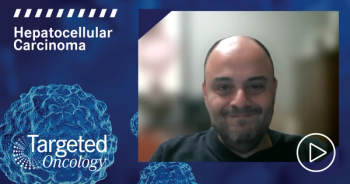
Physicians Discuss Their Impressions of Recent IO/TKI Trials for HCC
During a Targeted Oncology case-based roundtable event, Amit Singal, MD, and participants discussed the significance of LEAP-002 and other trials investigating immunotherapy plus tyrosine kinase inhibitor therapy in patients with hepatocellular carcinoma.
DISCUSSION QUESTION
- Would the data from the single-agent lenvatinib (Lenvima) arm of the LEAP-002 trial (NCT03713593) change your approach to treating HCC?
ROBERT YOO, MD: I think the previous noninferiority study for lenvatinib led me to use that.1 But, when the IMbrave150 [NCT03434379] data came out, my practice would change to [atezolizumab (Tecentriq) plus bevacizumab (Avastin)]. Now [after] the LEAP-002 trial with the striking 19-month median overall survival, I feel very confident in using single-agent lenvatinib again.
RUPESH PARIKH, MD: Dr Singal, were you surprised by the lenvatinib data?
AMIT SINGAL, MD: The LEAP-002 data? Yes.
PARIKH: Wouldn’t you want a secondary trial to confirm because it’s so far different than any of the previous TKI [tyrosine kinase inhibitor] trials?
SINGAL: Remember, the other TKI trials, if you take a look at duration on treatment, they were much shorter.
PARIKH: But why?
SINGAL: I think it’s because this was a double-blind, placebo-controlled trial. There were many [patients and providers] who thought the patients were receiving lenvatinib/pembrolizumab. As a provider, if I’m prescribing TKI and IO [immunotherapy] in the frontline, I don’t know what I have in the second line that I would even feel comfortable going to. [For patients, they believed they were] on what is supposed to be the most potent medication combination that will be on market. I think there were patients who stayed on [lenvatinib plus placebo] therapy because they thought they were receiving lenvatinib/pembrolizumab.
PARIKH: Are the responses later, then? Should we not even assess response for 4 to 6 months?
SINGAL: How this changes practice is a very interesting thing. This is my view on the LEAP-002 data: the first time I heard about the trial, [I asked why did the investigators] set themselves up against lenvatinib? If we all believe lenvatinib is a better agent, why do you not take the acceptable low bar instead of setting yourself up for this possible failure down the road, which is what we’re dealing with right now.… Now they have to deal with the repercussions of essentially having overthought themselves in terms of putting lenvatinib as the comparator arm.
SANTHOSH AMBIKA, MD: We have experience with the COSMIC-312 trial [NCT03755791]. That also failed [its OS end point for cabozantinib (Cabometyx) plus atezolizumab versus sorafenib].2 So [LEAP-002] is not the first time [an immunotherapy plus TKI failed in HCC]. I was surprised with the COSMIC-312 data.
SINGAL: I was surprised with COSMIC-312 as well. COSMIC-312 failed for different reasons—because the combination did not perform as well as it should. Remember, COSMIC-312 met its progression-free survival [PFS] end point. It just didn’t hit its OS end point, so it’s not a negative trial, it’s just a trial that isn’t going to change clinical practice because it didn’t improve OS.2
COSMIC-312 “failed” because the combination didn’t achieve the OS benefit that it was supposed to. LEAP-002 is different because lenvatinib/pembrolizumab performed as it should. It gave 21 months [median OS].3 That’s exactly what it was supposed to do. Was I surprised that lenvatinib gave 19 months [median OS]? Yes.
What do I do with that? My view on the LEAP-002 trial is I personally still believe atezolizumab [Tecentriq] plus bevacizumab [Avastin] is the preferred therapy out there. I think durvalumab [Imfinzi] plus tremelimumab [Imjudo] is a very good alternative, although I think lenvatinib is on that playing field. So if somebody is not eligible for atezolizumab/bevacizumab, I choose between durvalumab/tremelimumab and lenvatinib.
The second point that I’d say is if I’m going to start somebody on lenvatinib, I’m going to be dedicated to it. I’m not going to call it quits early. I’m going to say that if we fight through the AEs, we dose reduce, and we keep the patient on this therapy, it can induce very good OS. We just need to keep the patient on it for longer periods of time and then use subsequent lines of therapy as available. So that’s the way that I’ve incorporated LEAP-002 in my clinical practice.
AMBIKA: I have a theoretical question. If you just use lenvatinib in the frontline setting and use ipilimumab [Yervoy] plus nivolumab [Opdivo] second line, do you think they’ll outperform frontline atezolizumab/bevacizumab followed by cabozantinib? [Or] are we extrapolating too much?
SINGAL: The question here is about the optimal sequence, and we don’t know. There are no data comparing these different sequences. All we know is that atezolizumab/bevacizumab gave the best long-term survival in the frontline setting in a sicker patient population that didn’t exclude main portal vein invasion and greater than 50% liver involvement, meaning they had the biggest tumor burdens.4 It’s very safe, and so I think most of us would say atezolizumab/bevacizumab is the preferred therapy in the frontline when possible. Then [if there is disease progression], that’s where we have to choose what we think [should be used] in the second line.
References:
1. Kudo M, Finn RS, Qin S, et al. Lenvatinib versus sorafenib in first-line treatment of patients with unresectable hepatocellular carcinoma: a randomised phase 3 non-inferiority trial. Lancet. 2018;391(10126):1163-1173. doi:10.1016/S0140-6736(18)30207-1
2. Kelley RK, Rimassa L, Cheng AL, et al. Cabozantinib plus atezolizumab versus sorafenib for advanced hepatocellular carcinoma (COSMIC-312): a multicentre, open-label, randomised, phase 3 trial. Lancet Oncol. 2022;23(8):995-1008. doi:10.1016/S1470-2045(22)00326-6
3. Finn RS, Kudo M, Merle P, et al. LBA34 - Primary results from the phase III LEAP-002 study: Lenvatinib plus pembrolizumab versus lenvatinib as first-line (1L) therapy for advanced hepatocellular carcinoma (aHCC). Ann Oncol. 2022;33(suppl_7):S808-S869. doi:10.1016/annonc/annonc1089
4. Cheng AL, Qin S, Ikeda M, et al. Updated efficacy and safety data from IMbrave150: Atezolizumab plus bevacizumab vs. sorafenib for unresectable hepatocellular carcinoma. J Hepatol. 2022;76(4):862-873. doi:10.1016/j.jhep.2021.11.030








































